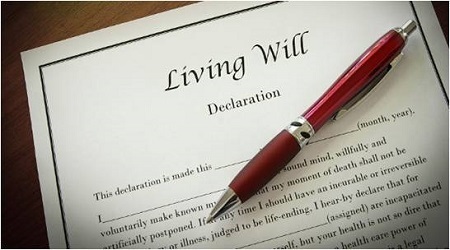Create a Living Will in less than 5 minutes
Professionally reviewed
Print and export to Word or PDF in seconds
A living will is legal document that specifies a person's wishes regarding medical treatment, specifically treatments that will prolong life. This may be used if you are unable to make medical decisions for yourself due to severe injury or a medical condition. A living will is typically only used in deathbed situations. They typically detail any Do Not Resuscitate orders from the party creating the living will. It may also be used for people who wish to refuse dialysis or blood transfusions for personal or religious reasons.
Only someone who is 18 years or older and of sound mind can create a living will. Creating a living will means you need to choose a party you trust to carry out medical wishes on your behalf. This could be a family member, trusted friend, or an attorney.
Click here to get started now!
A living will, health care directive or advance directive is a legal document verifying a person’s wishes regarding end-of life-medical procedures. It comes into effect when that individual can no longer make decisions for him or herself.

What areas of “end of life” does a living will deal with?
A living will typically handles life-prolonging treatments in the case of unconsciousness or severe illness. Medically speaking, it is a last resort. A living will cannot take effect unless the following criteria are met –
· The subject is unable to make his or her own decisions, due to coma, dementia or some other incapacitating factor.
· The subject has no hope of recovery.
· The subject’s inability to speak for himself or herself is certified by two separate medical authorities, one of who is that subject’s physician.
When to create a living will
Creating a living will is not the cheeriest process, but in many cases it should be done. Create a living will if any of the following criteria apply to you:
When you are diagnosed with a terminal ailment, such as cancer or AIDS.
When you legally qualify as a senior
Creating a living will
Remember, a living will must contain your final wishes. Consider the following issues –
At what point do you not want to be resuscitated?
What level of treatment do you want your caretakers to stretch to for you? Consider your and your family’s financial situations carefully when making this decision.
Keep in mind that a living will may only take effect when your medical condition is “hopeless.” Most of the specifications will have to do with palliative care, not cure.
It’s a good idea to have a health care proxy, or someone who can make decisions for you should you become incapacitated. This person, designated by a legal document called a power of attorney, can serve as the buffer zone between your fate and the tenets of your living will.
Be sure you include all necessary points. The easiest way to do this, actually, is to use a living will template, which you can easily find on the internet. By customizing such a template, you are essentially generating a legally certifiable living will form. It’s a great way to be sure you have all your affairs in order.

If you even become incapacitated due to a terminal accident or illness, you will do well to have living will in your corner. A living will, also known as a medical directive, is a legal form that outlines your preferences for continued medical treatment. Whether you are staunch believer that life should be extended at all costs or a shirker of a vegetative state, a living will is the document you can count on to carry out your wishes.
When does a living will come into effect?
The exact point at which your living will takes effect depends on a couple of factors:
State and local laws
These define the point at which you can be considered incapacitated. This exact point varies from state to state, but it’s a safe bet that if you’re in a coma or an advanced stage of terminal illness, you’re a candidate for the terms outlined in your living will. State and local laws also dictate how the living will must be signed and witnessed
Adequate verification
Usually it must be verified by at least two medical professionals that you have indeed reached the point of no return.
Legal limitations of a living will
Realistically speaking, your living will cannot provide for every possible outcome. For this reason, you should use language that addresses the most likely situations and be clear about your wishes.
The best way to do this is to provide instructions for very specific situations using clear, concise language . Here are a couple of examples:
" If I am in what has been medically determined a permanent vegetative state, and subsisting only off of life support, I do not want my life to be prolonged by life support, artificial hydration and feeding, or any other life-sustaining treatment.
“If I have suffered severe central nervous system damage and am not expected to recover, I do not want my life to be prolonged via any life-sustaining treatments, including but not limited to artificial hydration, artificial feeding, and life support technology.”
Alternatively, you might say:
“I want my life to be prolonged to the greatest extent possible, without regard to cost, condition, the likelihood or my recovery or the burdens incurred on others.”
What you dictate in your will is up to you. Bear in mind that in some cases, doctors may not be able to continue treatment. Cases determined to be medically hopeless are considered a waste of resources and cannot be controlled by the tenets of a living will.
How do I draw up a living will?
You want to be sure you cover all the bases, but what exactly are the bases? It is difficult and troubling to imagine what sorts of situations might be likely to arise at the end of your life. The easiest approach is to download a living will form from a decent document generator and just fill in the blanks. That way you have a skeleton to work with and needn’t spend so much time thinking about unpleasant things.

Nobody likes the tedious and, frankly, grim process of creating a living will. However, it’s something you should consider doing if you are getting up there in years, in a dangerous profession or state of health or financially well endowed. To make the process easier, here are the main components of a living will:
Your info and the date
This is pretty straightforward. Put your full legal name, street address and the date on which your will shall take effect.
Health care directives
This part varies significantly depending on what sorts of end-of-life directives your living will issues. Common directives include –
Instructions
This is the beefy part of your living will. You should provide instructions as to how to proceed should you become terminally ill, unconscious or otherwise not sound enough of mind to express your wishes .
Naming of health care proxies, if any
Health care proxies are individuals granted a say in your treatment should you become terminally ill. If you become incapable of making your own decisions, the responsibility falls to them.
Witness Information
You must have a witness present at the legitimization of your living will. The job of this witness is to verify that your living will reflects your wishes. For the sake your protection, your witness should have no vested interest in your declining health, meaning he or she must not be a beneficiary of your will, a relative, or related to your medical care in any way. The full legal name and street address of your witness should appear on your living will.
Signatures
Your living will must be signed by both you and your witness. A notary public is not necessary in this case.